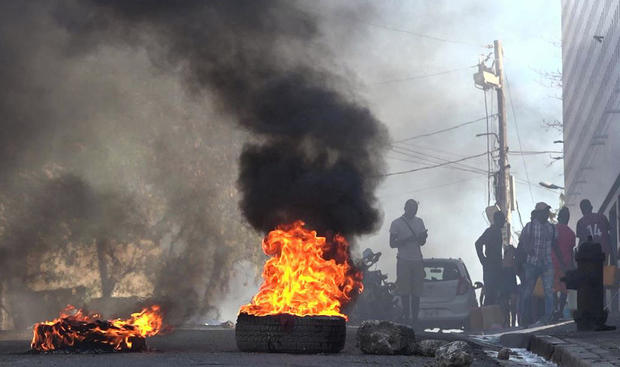Gangs in Haiti try to seize control of main airport as thousands escape prisons: “Massacring people indiscriminately”
In an outburst of violence that included a mass breakout from the nation’s two largest jails, heavily armed gangs attempted to take over Haiti’s main international airport on Monday, exchanging gunfire with police and troops in the latest attack on important government buildings.
At the time of the incident, Toussaint Louverture International Airport was closed, meaning that neither aircraft nor passengers were present.
As gangs attempted to access the airport premises, an armored truck on the tarmac fired shots in an attempt to dissuade them, sending numerous staff and other personnel running for their lives. Associated Press journalists witnessed this action.
As of late Monday, it was unclear if the attack—the largest to target the airport in Haitian history—was successful.
Although there have been regular gang attacks, the airport was briefly hit by gunfire last week, but the gangs were unable to penetrate or take control of the facility.
The assault happened just hours after Haitian authorities imposed a curfew at night in response to violence over the weekend in which armed gang members stormed the country’s two largest jails and released thousands of prisoners.

“The secretary-general is deeply concerned by the rapidly deteriorating security situation in Port-au-Prince, where armed gangs have intensified their attacks on critical infrastructure over the weekend,” said UN spokesman Stephane Dujarric.
On Sunday night, a 72-hour state of emergency was declared. The government said that it will make an effort to find the runaway prisoners, including those from a prison where most of the inmates were being held pending trial and where some of them were suspected of killing people, kidnappings, and other crimes.
“The acting prime minister, Finance Minister Patrick Boivert, ordered the police to use every legal means at their disposal to enforce the curfew and apprehend all offenders,” the statement read.
It was once thought that up to 80% of the capital, Port-au-Prince, was controlled by gangs. They are picking hitherto unimaginable targets, such as the Central Bank, and coordinating their attacks more and more.
Last week, Prime Minister Ariel Henry visited Kenya in an attempt to win over backing for a security force supported by the UN to aid in stabilizing Haiti during its struggle with the more potent criminal organizations.
The secretary-general, according to Dujarric, emphasized the need for quick action, particularly in terms of funding the mission, “to address the pressing security requirements of the Haitian people and prevent the country from plunging further into chaos.”
According to the U.N., Haiti’s National Police has about 9,000 officers to protect over 11 million people. They are consistently outnumbered and outmatched.
As per Ulrika Richardson, the UN Humanitarian Coordinator in Haiti, there was “a very steep increase” in gang-related violence such as rapes, lynchings, and killings last year. She noted, repeating recent findings by the UN human rights office, that this tendency has persisted into 2024, with January being the most violent month in the previous two years.
According to the UN immigration office, violence has resulted in at least 15,000 people being evacuated.
“Please, please help us”
The violent weekend represented a new low in Haiti’s violent decline. Since Thursday, gangs in Port-au-Prince have increased their coordinated attacks on official institutions, like as the national soccer stadium and international airport, killing at least nine people, four of them police officers.
Yet Haitians were taken aback by the attack on the National Penitentiary late on Saturday. According to the Office of Citizen Protection, all but 98 of the 3,798 prisoners housed at the penitentiary managed to get out. Meanwhile, 1,033 inmates—including 298 prisoners—escaped from the Croix-des-Bouquets jail.
Following the mass escape, the office stated late on Monday that it was extremely concerned for the safety of judges, prosecutors, victims, attorneys, and other people.
Furthermore, it stated that it “deplored and condemned the policy of nonchalance” displayed by government representatives in the wake of the assaults.
Three dead with gunshot wounds were found at the prison door on Sunday, following the raid at the penitentiary.
In another neighborhood, people were passing by roadblocks made of burning tires while the bloodied bodies of two guys, their wrists bound behind their backs, lay face down.
A select group of twelve individuals choose to remain incarcerated, including eighteen former Colombian soldiers who were charged with acting as hired guns in the July 2021 killing of Haitian President Jovenel Moïse.
“Please, please help us,” Francisco Uribe, one of the men, pleaded in a message that went viral on social media. “They are massacring people indiscriminately inside the cells.”

The foreign ministry of Colombia has demanded that Haiti give the men “special protection.”
Around 1,400 prisoners were housed in a second jail in Port-au-Prince that was also overrun.
Numerous neighborhoods in the capital reported gunfire. Many locals were without internet access on Sunday because, according to Haiti’s leading mobile network, a fiber optic cable link was severed during the outburst.
All official travel to Haiti has been suspended, according to the U.S. Embassy, following gang-related shooting at the nation’s international airport last week. It asked every American citizen to leave as quickly as possible on Sunday night.
While providing financial and logistical support, the Biden administration has declined to commit soldiers to any international force for Haiti. The government stated that it was gravely concerned about the rapidly deteriorating security situation.
The increase in attacks comes after weeks of deadly protests, during which the prime minister traveled to Kenya in an attempt to advance plans for an East African nation to lead a U.N.-backed security mission.
After Moise was assassinated, Henry became prime minister. Since then, there haven’t been any plans for legislative or presidential elections for nearly ten years.
Jimmy Chérizier, a gang federation leader and former special police officer known as Barbecue, has taken credit for the recent spike in attacks.
Haitian Americans are stuck in Haiti
Many travel advisories have been released by the US State Department, asking visitors and State Department personnel on the island to remain put and exercise caution.
All flights into and out of Haiti’s two airports are canceled at Miami and Fort Lauderdale-Hollywood International Airports, CBS Miami reported. Numerous Haitian Americans remain on the island in spite of numerous warnings. They consider Haiti to be home, so leaving is difficult.
Among those persons is Tania Francois of CBS News Miami’s sister.
“I’ve been stuck in my city where I’m living now for about two months,” she stated. “Trying to make it into Port Au Prince so I can fly to the States, and I just can’t leave.”
According to CBS Miami, Kareen Ulysse, a Haitian American employed in Haiti, runs the Centre Hospitalier de Fontaine, a hospital and orphanage located in the Cite Soleil area of Port au Prince.
“We work literally in the ghettos for the most vulnerable people and there’s no help, there’s no one really standing in line to help people like them,” she stated.
Gunfire close to the U.S. Embassy in Haiti forced it to close in August of last year, following months of gang-related violence that forced thousands of Haitians onto the streets to demand protection.
